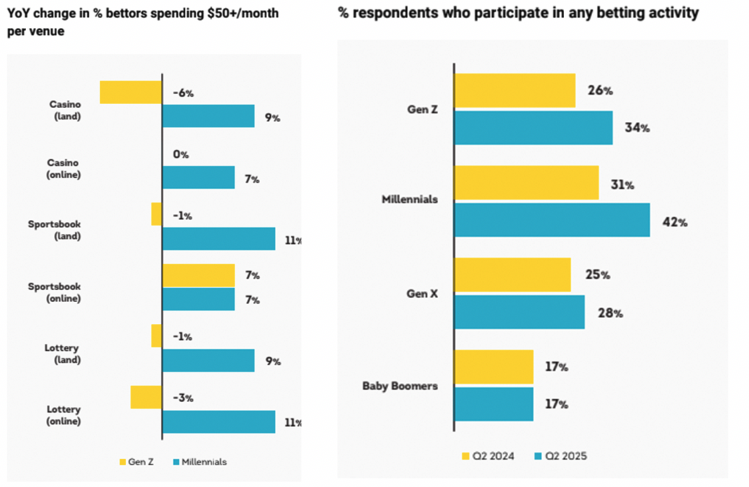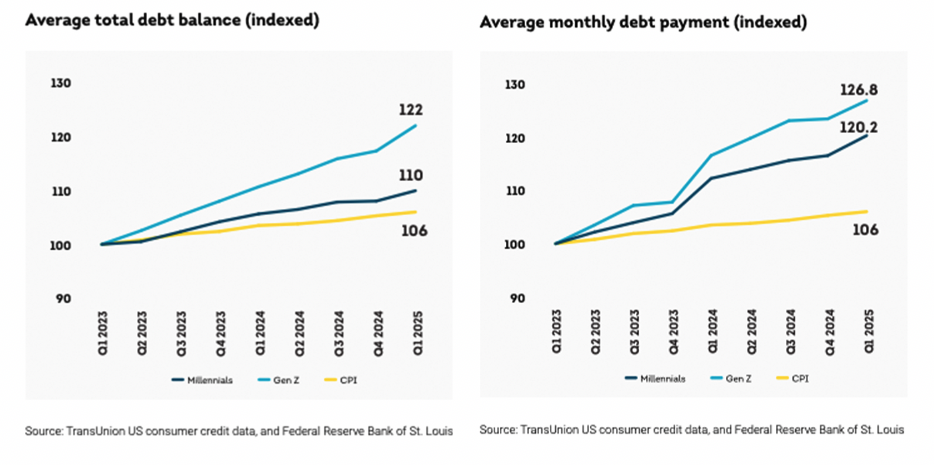Younger Bettors Drive U.S. Gambling Growth As Debt Raises Red Flags, TransUnion Study Finds

A surge in U.S. gambling growth in the second quarter was driven primarily by younger adult consumers, with 34% of Gen Z and 42% of Millennials engaged in wagering.
Both groups were especially active in online sports betting, casino play, and other speculative forms of gambling tied to financial risk-taking, according to TransUnion's latest U.S. Betting Report.
It found that 30% of consumers engaged in U.S. betting activity during Q2—up from 25% in the same period a year ago.
And they remain the most-active segments helping U.S. gambling growth, TransUnion found in its survey released Wednesday.
“Within Millennial and Gen Zs, we see a financial speculation behavior. That's a byproduct of the technology that these generations have grown up with,” Declan Raines, head of TransUnion’s Gaming business, told bookies.com. “These generations are far more experience with Robinhoods, your Fidelities trading in a way that prior generations would've worked with stockbrokers or more telephone-based services. We've seen with the liberalization of access to financial markets that these generations have higher usage, and then by extension, they tend to have higher usage within sports betting.”
Casinos Still Lead, But Online Sportsbooks Rising
Land-based casinos remained the most popular destination for bettors overall in determining U.S. gambling growth, but online sportsbooks continued to gain ground—especially with Gen Z players.
This is part of a broader behavior pattern.
“Younger folks to try to grow their financial positions a little bit more aggressively, and then when they reach certain milestones, they tend to reassess their risk strategies,” Raines said. “The key thing here is we're seeing that within the younger demographics today the specifics of what that looks like within today's technology landscape. Now, the question is ‘OK, where is this going to end?’ Right? Are we going to see that reallocation? Are we going to see that shift in behavior to a more kind of risk-averse approach, or is it going to continue?.
"Because what is important is we're not seeing income increase like we've seen over the last few years. We're starting to see inflation bite, and so we would hope and expect that younger consumers are modifying their spending habits, their debt activities accordingly. But it's going to be very interesting to in 2026 whether that remains to be the case.”
Gen Z activity dipped across most verticals but jumped 7% in online sports betting.
Millennials boosted their play across the board, with double-digit growth in land-based sportsbooks (+11%), online casinos (+7%), and online lotteries (+11%).
The data confirms what operators have seen since sports betting expansion accelerated in 2018: digital wagering is increasingly the entry point for younger consumers, while casinos remain sticky for older generations.
Risk Tolerance Remains High Among Young

The report highlighted a strong overlap between younger bettors and broader financial speculation. Using data from its TruAudience platform, TransUnion found that the most active Millennial and Gen Z bettors were:
- Urban-based renters without children (though more Millennials were homeowners and parents).
- Heavy users of cryptocurrency and trading apps, suggesting crossover between investing, gambling, and speculative behavior.
- More likely to take risks in other areas, such as adventure travel, stock trading, and impulse buying.
“We saw a clear pattern of financial speculation among regular bettors,” Raines said. “These are consumers chasing big payoffs—whether in the market, on vacation, or on a sportsbook app.”
Rising Debt Signals Risk For Millennials, Gen Z

While betting activity is expanding, the financial foundation of these players is shaky. The report found:
Millennial debt payments are up 20% year-over-year.
Gen Z debt payments jumped 27%, far outpacing both inflation (6%) and wage growth (8%).
Student loan obligations, inflationary pressures from tariffs, and reduced consumer confidence were cited as potential threats to long-term betting growth. Since discretionary income remains the strongest predictor of gambling activity, rising debt could slow engagement—especially among younger bettors.
Sustainability 'Requires A Village'
For operators, the challenge lies in balancing short-term revenue with long-term consumer stability.
New Jersey recently proposed a set of responsible gaming procedures and regulations that licensed on-line operators must follow.
Raines sees this as an important step. But not the only one.
“This requires a village, right? There's a lot of stakeholders in this sector. It is also a duty of regulators to create policy frameworks that protect consumers and also retain the competitive environment that we want for the US market. That reduces offshore involvement, which is still too high in the us, but I think it's a myriad of different stakeholders that need to be accountable for that, including companies like us at TransUnion,” Raines said. “This really establishes a pretty strong beach head from a regulatory standpoint for the US market."
"Markets like New Jersey are kind of the trendsetter in the U.S. It’ll be interesting to see how other states follow suit. We support a multi-jurisdictional approach. Ultimately, you want more states doing pretty much the same thing.”
Comments